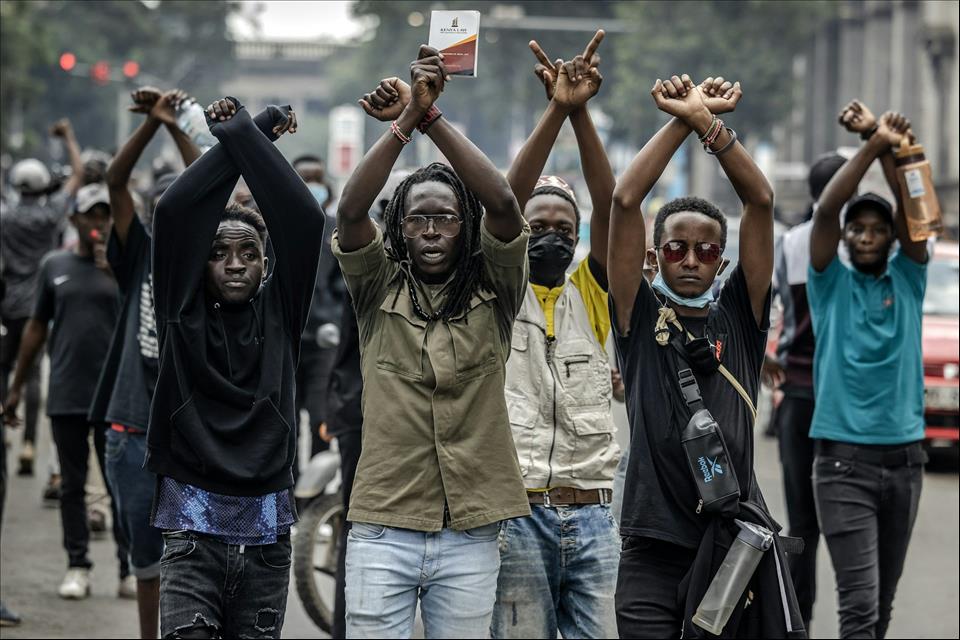
Kenya Protests: Gen Z Shows The Power Of Digital Activism - Driving Change From Screens To The Streets
The mass protests , initially organised in the capital city, Nairobi, have spread across the country. Demonstrations have taken place in almost every city and major town. Digital media and activism expert Job Mwaura shares his insights into how the protests were mobilised on online, and then onto the streets.
How are Kenyans using the digital space in this movement?This is a powerful moment for digital activism. The protests have seen significant participation from young Kenyans who are using digital media to organise and voice their opposition. A great number of those driving the protests are Generation Z (often referred to as Gen Z) – individuals born roughly between the late 1990s and early 2010s and characterised by digital prowess and social consciousness. They have created this organic, grassroots movement which has used platforms, like social media, to mobilise and coordinate efforts quickly.
Through my work I've documented how essential digital media has been in political participation in Kenya in the past decade, particularly among the marginalised communities such as the young people and and women.
In the current protests, we are seeing just how innovative activists can be when using digital media. The digital tools and strategies employed today are taking activism to an entirely new level. They showcase a sophistication and reach that would've been hard to imagine.
They have deployed a number of old, and new, strategies.
Among the new has been Artifical Intelligence (AI) which has been used to create images, songs and videos that amplify the movement's messages and reach a wider audience.
AI was also used to help educate wider audiences on the bill. Developers, for instance, created specialised GPT (Generative Pre-trained Transformer) models designed to answer questions on the finance bill.
Platforms, like Tiktok and X are being used to share videos of people explaining the finance bill in various Kenyan dialects.
Hashtags – such as #OccupyParliament and #RejectFinanceBill2024 – trended on social media platforms for several days, further highlighting the power of digital activism in mobilising support and maintaining the momentum of the protests.
And then there has been very successful crowdfunding through digital platforms. This has enabled supporters to send money for transportation , allowing more people to join the protests in Nairobi's central business district.
Another has been the use of hacking of government websites , disrupting services and drawing attention to their cause.
Personal information, such as the phone numbers of political leaders, were leaked to allow protesters to spam them with SMS and WhatsApp messages. This forced the office of the data protection commissioner to issue a statement warning them to stop.
Activists have also created a website featuring a“wall of shame” that lists politicians who support the Finance Bill. This helped the protestors increase pressure on parliamentarians to potentially change their stance. Some constituents are taking steps to recall their MPs .
What stands out for you?That these protests are organic and that young people are playing a pivotal role. They have long felt dejected and neglected by the government. This widespread sense of disenfranchisement among them was a ticking time bomb, and it has finally exploded into fervent activism.
Unlike previous protests , these demonstrations emerged spontaneously from the grassroots. This shift underscores a significant transition in Kenyan politics. We are witnessing a shift from ethnic-based mobilisation to issue-based activism. People aren't coming together based on their tribe. They are uniting to fight for specific issues that affect their daily lives, such as economic policies, government accountability and social justice.
This new form of activism reflects a growing political maturity among Kenyans, who are prioritising shared concerns over ethnic divisions. It sets a new precedent for addressing social and political issues in the country.
Protesters chant anti-government slogans in downtown Nairobi, on June 18, 2024. Photo by LUIS TATO/AFP via Getty Images
What has also stood out is how digital activism has driven nationwide physical protests. Young people have moved off their screens and onto the streets, forcing leaders to listen and even make amendments to the finance bill before it was passed. This shows how online efforts can translate into real-world changes. It demonstrates the power and effectiveness of digital activism in shaping political discourse and policy.
Digital activism provides a powerful platform for diverse voices to be heard, catalysing change. It's enabled fast mobilisation of support, bridged gaps between diverse groups, and it has brought attention to pressing issues in real-time.
For many years, digital media activism has been labelled as“slacktivism ,” a term that refers to minimal effort activities like liking, sharing, or commenting online that are perceived as having little real-world impact.
However, these recent events show that political leaders can succumb to online pressure. They demonstrate that even small changes initiated online can lead to substantial outcomes.
Are there any drawbacks in this using the digital space for activism?Digital media is vulnerable to government censorship and interference.
During recent protests in Kenya, there were suspected signs of the internet being slowed down, resulting in increased buffering, lags in downloading files, and disruptions to services on certain Apps.
Despite these challenges, the impact of digital activism cannot be understated. It has revolutionised how people mobilise, communicate, and advocate for change.

Legal Disclaimer:
MENAFN provides the
information “as is” without warranty of any kind. We do not accept
any responsibility or liability for the accuracy, content, images,
videos, licenses, completeness, legality, or reliability of the information
contained in this article. If you have any complaints or copyright
issues related to this article, kindly contact the provider above.

















Comments
No comment